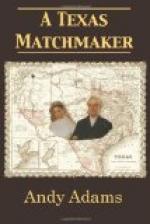Miss Jean had been the only representative of our ranch at Shepherd’s on San Jacinto Day. But she had had her eyes open on that occasion, and on our return had a message for nearly every one of us. I was not expecting any, still the mistress of Las Palomas had met my old sweetheart and her sister, Mrs. Hunter, at the ferry, and the three had talked the matter over and mingled their tears in mutual sympathy. I made a blustering talk which was to cover my real feelings and to show that I had grown indifferent toward Esther, but that tactful woman had not lived in vain, and read me aright.
“Tom,” said she, “I was a young woman when you were a baby. There’s lots of things in which you might deceive me, but Esther McLeod is not one of them. You loved her once, and you can’t tell me that in less than a year you have forgotten her. I won’t say that men forget easier than women, but you have never suffered one tenth the heartaches over Esther McLeod that she has over you. You can afford to be generous with her, Tom. True, she allowed an older sister to browbeat and bully her into marrying another man, but she was an inexperienced girl then. If you were honest, you would admit that Esther of her own accord would never have married Jack Oxenford. Then why punish the innocent? Oh, Tom, if you could only see her now! Sorrow and suffering have developed the woman in her, and she is no longer the girl you knew and loved.”
Miss Jean was hewing too close to the line for my comfort. Her observations were so near the truth that they touched me in a vulnerable spot. Yet as I paced the room, I expressed myself emphatically as never wishing to meet Esther McLeod again. I really felt that way. But I had not reckoned on the mistress of Las Palomas, nor considered that her strong sympathy for my former sweetheart had moved her to more than ordinary endeavor.
The month of May passed. Uncle Lance spent several weeks at the Booth ranch on the Frio. At the home ranch practice for the contests went forward with vigor. By the first of June we had sifted the candidates down until we had determined on our best men for each entry. The old ranchero and our segundo, together with Dan Happersett, made up a good set of judges on our special fitness for the different contests, and we were finally picked in this order: Enrique Lopez was to rope; Pasquale Arispe was to ride; to Theodore Quayle fell the chance of handling the lance, while I, being young and nimble on my feet, was decided on as the rider in the ten-mile relay race.
In this contest I was fortunate in having the pick of over three hundred and fifty saddle horses. They were the accumulation of years of the best that Las Palomas bred, and it was almost bewildering to make the final selection. But in this I had the benefit of the home judges, and when the latter differed on the speed of a horse, a trial usually settled the point. June Deweese proved to be the best judge




